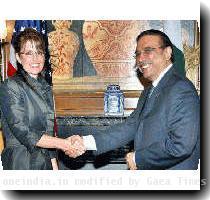A dozen suspected US missiles kill 17 in northwest Pakistani militant haven, officials say
By Rasool Dawar, APThursday, December 17, 2009
Officials: US missile barrage kills 17 in Pakistan
MIR ALI, Pakistan — Two U.S. missile strikes pummeled targets inside the main sanctuary used by al-Qaida and the Taliban along Pakistan’s border with Afghanistan, killing 17 people Thursday, local intelligence officials said.
The latest drone attacks came amid the prospect of renewed political instability in Pakistan, with President Asif Ali Zardari facing calls for his resignation after the Supreme Court struck down an amnesty that had protected him and thousands of other political officials from corruption charges.
The national anti-graft agency said 247 people who had been covered by the amnesty were banned Thursday from leaving the country because investigations of them had been reopened. The list included Defense Minister Ahmed Mukhtar, who told a local television station that immigration officials at the airport had barred him from boarding a plane to China. Zardari, who has presidential immunity from prosecution, was not on the list.
The missiles rained down Thursday on North Waziristan, a haven for many militants including groups determined to push the U.S. and NATO out of Afghanistan. The second, bloodier attack involved five drones and 10 missiles — an unusually intense bombardment, they said.
The strikes in North Waziristan are especially sensitive because they risk angering Afghan-focused militant groups who have agreed to be neutral as Islamabad cracks down on Taliban fighters in neighboring South Waziristan who have threatened the Pakistani state.
It was not immediately clear exactly who or what was the target of the strike, and the Pakistani officials said they were trying to establish the identities of the dead.
In the first strike, two missiles hit a car carrying two suspected insurgents in Dosali village, officials said. Later Thursday, the 10 missiles fired by five drones killed 15 people in two compounds in the Ambarshaga area. At least seven of the dead were foreigners, the officials said on condition of anonymity because they were not authorized to speak to media.
The U.S. has carried out more than 40 such missile strikes this year, killing scores of suspected al-Qaida and Taliban militants, but angering many Pakistanis who point to the resulting civilian casualties. Pakistan regularly condemns the attacks as violations of its sovereignty, but it is believed to secretly aid the U.S. campaign.
The U.S. rarely acknowledges the covert, CIA-run missile program. But when officials have confirmed the attacks, they say the drones are a crucial tool and note that the missiles have slain several top al-Qaida operatives as well as Pakistani Taliban chief Baitullah Mehsud.
The Pakistani intelligence officials on Thursday confirmed that the two strikes hit territory controlled by Hafiz Gul Bahadur, a warlord whose fighters focus on pushing out Western troops in Afghanistan. Bahadur has agreed to stay out of the way as the Pakistani army has waged an offensive in South Waziristan against the Tehrik-e-Taliban Pakistan — or Pakistani Taliban Movement.
The Pakistani Taliban have carried out scores of attacks against Pakistani security and government targets, spurring the army offensive. Even so, many of the group’s leaders are believed to have fled the army onslaught of recent weeks, finding refuge elsewhere in the tribal belt, including North Waziristan.
Analysts have warned that U.S. missile strikes could upset the deals with Bahadur and lead him to aid the Pakistani Taliban against the military. Still, a number of missile strikes have been carried out in the region in recent weeks, and there’s no evidence that has happened just yet.
Information from the tribal regions is nearly impossible to independently verify because access to the areas is severely restricted.
The U.S. has kept up its missile campaign even as it pushes Pakistan to do more against militant groups threatening Western interests in Afghanistan. Pakistan’s cooperation is more crucial than ever now that Washington is sending 30,000 more troops to Afghanistan.
The attacks also come amid political turbulence in Pakistan. Pakistan’s president is besieged by calls to resign after the Supreme Court struck down the amnesty that had protected him and several of his political allies from corruption charges.
While it is generally agreed that Zardari has immunity from prosecution as president, the Wednesday court ruling has paved the way for opponents to challenge his eligibility to hold the post. Zardari is already unpopular, in large part because of his close ties with Washington.
Zardari’s aides said any corruption charges against him were politically motivated and that there was no reason for him to step down. Critics countered he was morally obligated to resign, at least while the court heard any challenges to his rule.
“It will be in his own interest, it will be in the interest of his party and it will be good for the system,” said Khawaja Asif, a senior leader from the opposition Pakistan Muslim League party.
Mahsud reported from Dera Ismail Khan. Associated Press writers Chris Brummitt in Islamabad and Riaz Khan in Peshawar contributed to this report.
Tags: Afghanistan, As-pakistan, Asia, Asif Ali Zardari, Central Asia, Islamabad, Mir Ali, North America, Pakistan, Political Corruption, Political Issues, Political Resignations, South Asia, United States

